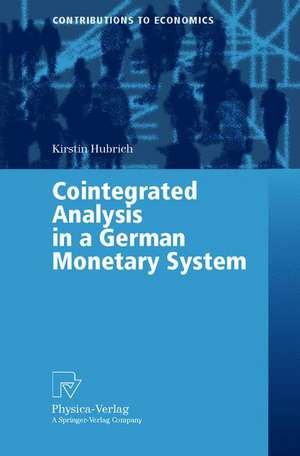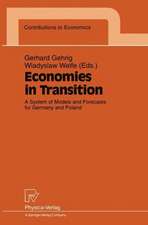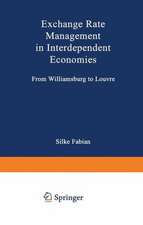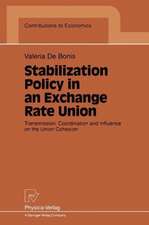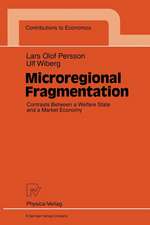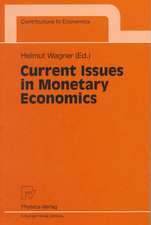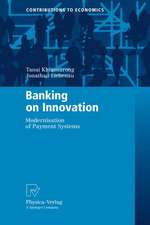Cointegration Analysis in a German Monetary System: Contributions to Economics
Autor Kirstin Hubrichen Limba Engleză Paperback – 27 noi 2000
Din seria Contributions to Economics
- 18%
 Preț: 1001.81 lei
Preț: 1001.81 lei -
 Preț: 90.83 lei
Preț: 90.83 lei - 15%
 Preț: 649.06 lei
Preț: 649.06 lei - 18%
 Preț: 1109.92 lei
Preț: 1109.92 lei - 24%
 Preț: 657.09 lei
Preț: 657.09 lei - 18%
 Preț: 976.54 lei
Preț: 976.54 lei - 17%
 Preț: 361.03 lei
Preț: 361.03 lei - 18%
 Preț: 1027.83 lei
Preț: 1027.83 lei -
 Preț: 283.93 lei
Preț: 283.93 lei - 15%
 Preț: 644.95 lei
Preț: 644.95 lei - 15%
 Preț: 638.24 lei
Preț: 638.24 lei -
 Preț: 394.29 lei
Preț: 394.29 lei - 15%
 Preț: 636.80 lei
Preț: 636.80 lei - 15%
 Preț: 637.78 lei
Preț: 637.78 lei - 18%
 Preț: 723.69 lei
Preț: 723.69 lei - 15%
 Preț: 635.47 lei
Preț: 635.47 lei - 15%
 Preț: 634.00 lei
Preț: 634.00 lei -
 Preț: 392.75 lei
Preț: 392.75 lei -
 Preț: 383.33 lei
Preț: 383.33 lei - 15%
 Preț: 637.28 lei
Preț: 637.28 lei - 15%
 Preț: 636.80 lei
Preț: 636.80 lei - 18%
 Preț: 950.96 lei
Preț: 950.96 lei - 15%
 Preț: 634.68 lei
Preț: 634.68 lei -
 Preț: 387.38 lei
Preț: 387.38 lei - 15%
 Preț: 647.27 lei
Preț: 647.27 lei - 15%
 Preț: 636.63 lei
Preț: 636.63 lei - 15%
 Preț: 639.73 lei
Preț: 639.73 lei -
 Preț: 385.62 lei
Preț: 385.62 lei - 15%
 Preț: 641.85 lei
Preț: 641.85 lei - 20%
 Preț: 649.60 lei
Preț: 649.60 lei - 15%
 Preț: 641.71 lei
Preț: 641.71 lei -
 Preț: 387.96 lei
Preț: 387.96 lei - 15%
 Preț: 645.47 lei
Preț: 645.47 lei -
 Preț: 385.08 lei
Preț: 385.08 lei - 15%
 Preț: 646.62 lei
Preț: 646.62 lei -
 Preț: 383.33 lei
Preț: 383.33 lei - 15%
 Preț: 638.43 lei
Preț: 638.43 lei -
 Preț: 381.21 lei
Preț: 381.21 lei - 15%
 Preț: 642.51 lei
Preț: 642.51 lei - 15%
 Preț: 637.78 lei
Preț: 637.78 lei - 15%
 Preț: 641.71 lei
Preț: 641.71 lei -
 Preț: 384.70 lei
Preț: 384.70 lei -
 Preț: 379.86 lei
Preț: 379.86 lei -
 Preț: 378.34 lei
Preț: 378.34 lei -
 Preț: 384.70 lei
Preț: 384.70 lei -
 Preț: 388.52 lei
Preț: 388.52 lei - 15%
 Preț: 641.71 lei
Preț: 641.71 lei -
 Preț: 381.00 lei
Preț: 381.00 lei - 15%
 Preț: 644.95 lei
Preț: 644.95 lei -
 Preț: 386.00 lei
Preț: 386.00 lei
Preț: 381.98 lei
Nou
Puncte Express: 573
Preț estimativ în valută:
73.09€ • 78.16$ • 60.94£
73.09€ • 78.16$ • 60.94£
Carte tipărită la comandă
Livrare economică 18 aprilie-02 mai
Preluare comenzi: 021 569.72.76
Specificații
ISBN-13: 9783790813524
ISBN-10: 3790813524
Pagini: 188
Ilustrații: X, 177 p.
Dimensiuni: 155 x 235 x 10 mm
Greutate: 0.27 kg
Editura: Physica-Verlag HD
Colecția Physica
Seria Contributions to Economics
Locul publicării:Heidelberg, Germany
ISBN-10: 3790813524
Pagini: 188
Ilustrații: X, 177 p.
Dimensiuni: 155 x 235 x 10 mm
Greutate: 0.27 kg
Editura: Physica-Verlag HD
Colecția Physica
Seria Contributions to Economics
Locul publicării:Heidelberg, Germany
Public țintă
ResearchCuprins
1 Introduction.- 1.1 Motivation.- 1.2 Outline.- 2 Systems Cointegration Tests.- 2.1 Introduction.- 2.2 Cointegration Rank Tests: The Framework.- 2.3 Likelihood Ratio Tests.- 2.4 Other Tests.- 2.5 New Small Sample Simulations.- 2.6 Further Deterministic Terms: Dummy Variables.- 2.7 Recommendations for Applied Research.- 3 A Cointegrated Monetary System for Germany.- 3.1 Introduction.- 3.2 Monetary Policy Strategies and the ECB.- 3.3 Long-Run Monetary Relations.- 3.4 Empirical Analysis.- 4 Concluding Remarks and Outlook.- 4.1 Systems Cointegration Tests.- 4.2 Empirical Analysis of a German Monetary System.- 4.3 Further Research.- 4.4 Outlook: Lessons for the ECB.- A Trend-adjusted LR Tests: Dummy Variables.- B Data.- List of Figures.- List of Tables.
Textul de pe ultima copertă
With the decision of the European Central Bank to assign a prominent role to a monetary aggregate in its policy strategy, it is essential to further understand the policy of monetary targeting of the German Bundesbank and the conditions under which it succeeded. The focus of the empirical analysis is on long-run monetary relationships. A small sample simulation analysis compares the size and power properties of a broad range of systems cointegration tests. The results determine the methods chosen for the cointegration analysis of a small system of macroeconomic variables for Germany. Three stable long-run economic relationships are found which are of major interest for the conduct and transmission of monetary policy in Germany. With the stability of the long-run money demand relation one precondition for the monetary targeting strategy of the Bundesbank is fulfilled. The analysis accounts for the structural break of German reunification and examines the robustness of the empirical results.
